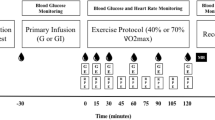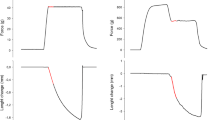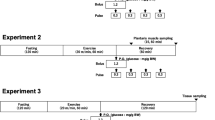Abstract
Carbohydrate administration increases endurance in man, and this could be associated with a reduction in muscle glycogen utilization in type I but not in type II fibres. Glucose infusion also attenuates fatigue in the rat plantaris muscle (94% type II fibres) stimulated indirectly in situ, but this is not associated with a glycogen sparing effect. The aims of this study were to verify if glucose infusion would attenuate fatigue and would reduce glycogen utilization in a muscle predominantly composed of type I fibres. For this purpose, the soleus muscle (84% type I fibres) was indirectly stimulated in situ in anaesthetized rats for 60 min while infusing either saline or glucose (1 g.kg−1.h−1; plasma glucose 7.7 mmol.l−1 vs. ~5 mmol.l−1 with saline only). The experimental data were expressed as the means (SD). With and without glucose, the dynamic force decreased by ~20% in the first minute of stimulation. With the infusion of saline, the dynamic force further decreased to 55% of the initial value at the end of the 60-min period of stimulation, but when glucose was infused for 60 min, the dynamic force remained constant at 78% of the initial value. When glucose was infused starting at min 30, dynamic force was partially restored. However, muscle glycogen utilization was not significantly different with the infusion of glucose compared to with the infusion of saline. These results suggest that glucose infusion attenuates fatigue in type I muscle fibres, but that this is not associated with any muscle glycogen sparing.



Similar content being viewed by others
References
Bagby GJ, Green HJ, Katsuta S, Gollnick PD (1978) Glycogen depletion in exercising rats infused with glucose, lactate, or pyruvate. J Appl Physiol 45:425–429
Bjorkman O, Sahlin K, Hagenfeldt L, Wahren J (1984) Influence of glucose and fructose ingestion on the capacity for long-term exercise in well-trained men. Clin Physiol 4:483–494
Carter JM, Jeukendrup AE, Mann CH, Jones DA (2004) The effect of glucose infusion on glucose kinetics during a 1-h time trial. Med Sci Sports Exerc 36:1543–1550
Chryssanthopoulos C, Williams C, Nowitz A, Kotsiopoulou C, Vleck V (2002) The effect of a high carbohydrate meal on endurance running capacity. Int J Sport Nutr Exerc Metab 12:157–171
Coggan AR, Coyle EF (1987) Reversal of fatigue during prolonged exercise by carbohydrate infusion or ingestion. J Appl Physiol 63:2388–2395
Coggan AR, Coyle EF (1991) Carbohydrate ingestion during prolonged exercise: effects on metabolism and performance. Exerc Sport Sci Rev 19:1–40
Conlee RK (1987) Muscle glycogen and exercise endurance: a twenty-year perspective. Exerc Sport Sci Rev 15:1–28
Coyle F (1997) Fuels for performance. In: Lamb R, Murray R (eds) Perspectives in exercise and sports medicine: optimizing sport performance. Cooper Publishing, Carmel
Coyle EF, Coggan AR, Hemmert MK, Ivy JL (1986) Muscle glycogen utilization during prolonged strenuous exercise when fed carbohydrate. J Appl Physiol 61:165–172
Davis JM, Bailey SP, Woods JA, Galiano FJ, Hamilton MT, Bartoli WP (1992) Effects of carbohydrate feedings on plasma free tryptophan and branched-chain amino acids during prolonged cycling. Eur J Appl Physiol Occup Physiol 65:513–519
Delp MD, Duan C (1996) Composition and size of type I, IIA, IID/X, and IIB fibers and citrate synthase activity of rat muscle. J Appl Physiol 80:261–270
Farris JW, Hinchcliff KW, McKeever KH, Lamb DR, Thompson DL (1998) Effect of tryptophan and of glucose on exercise capacity of horses. J Appl Physiol 85:807–816
Febbraio MA, Stewart KL (1996) CHO feeding before prolonged exercise: effect of glycemic index on muscle glycogenolysis and exercise performance. J Appl Physiol 81:1115–1120
Febbraio MA, Keenan J, Angus DJ, Campbell SE, Garnham AP (2000) Pre-exercise carbohydrate ingestion, glucose kinetics, and muscle glycogen use: effect of the glycemic index. J Appl Physiol 89:1845–1851
Fitts RH (1994) Cellular mechanisms of muscle fatigue. Physiol Rev 74:49–94
Flynn MG, Costill DL, Hawley JA, Fink WJ, Neufer PD, Fielding RA, Sleeper MD (1987) Influence of selected carbohydrate drinks on cycling performance and glycogen use. Med Sci Sports Exerc 19:37–40
Hargreaves M (1999) Metabolic responses to carbohydrate ingestion: effects on exercise performance. In: Lamb R, Murray R (eds) Perspectives in exercise and sports medicine: the metabolic basis of performance in exercise and sport. Cooper Publishing, Carmel
Hargreaves M, Richter EA (1988) Regulation of skeletal muscle glycogenolysis during exercise. Can J Sport Sci 13:197–203
Hargreaves M, Costill DL, Coggan A, Fink WJ, Nishibata I (1984) Effect of carbohydrate feedings on muscle glycogen utilization and exercise performance. Med Sci Sports Exerc 16:219–222
Hargreaves M, Costill DL, Fink WJ, King DS, Fielding RA (1987) Effect of pre-exercise carbohydrate feedings on endurance cycling performance. Med Sci Sports Exerc 19:33–36
Jeukendrup AE (2004) Carbohydrate intake during exercise and performance. Nutrition 20:669–677
Jeukendrup AE, Raben A, Gijsen A, Stegen JH, Brouns F, Saris WH, Wagenmakers AJ (1999) Glucose kinetics during prolonged exercise in highly trained human subjects: effect of glucose ingestion. J Physiol (Lond) 515: 579–589
Karelis AD, Peronnet F, Gardiner PF (2002) Glucose infusion attenuates muscle fatigue in rat plantaris muscle during prolonged indirect stimulation in situ. Exp Physiol 87:585–592
Karelis AD, Peronnet F, Gardiner PF (2003) Insulin does not mediate the attenuation of muscle fatigue associated with glucose infusion in rat plantaris muscle stimulated in situ. J Appl Physiol 95:330–335
Lo S, Russell JC, Taylor AW (1970) Determination of glycogen in small tissue samples. J Appl Physiol 28:234–236
Maughan RJ (1991) Fluid and electrolyte loss and replacement in exercise. J Sports Sci 9:117–142
McConell G, Snow RJ, Proietto J, Hargreaves M (1999) Muscle metabolism during prolonged exercise in humans: influence of carbohydrate availability. J Appl Physiol 87:1083–1086
Mitchell JB, Costill DL, Houmard JA, Fink WJ, Pascoe DD, Pearson DR (1989) Influence of carbohydrate dosage on exercise performance and glycogen metabolism. J Appl Physiol 67:1843–1849
Slentz CA, Davis JM, Settles DL, Pate RR, Settles SJ (1990) Glucose feedings and exercise in rats: glycogen use, hormone responses, and performance. J Appl Physiol 69:989–994
Snow RJ, Carey MF, Stathis CG, Febbraio MA, Hargreaves M (2000) Effect of carbohydrate ingestion on ammonia metabolism during exercise in humans. J Appl Physiol 88:1576–1580
Tsintzas K, Williams C (1998) Human muscle glycogen metabolism during exercise. Effect of carbohydrate supplementation. Sports Med 25:7–23
Tsintzas OK, Williams C, Boobis L, Greenhaff P (1995) Carbohydrate ingestion and glycogen utilization in different muscle fibre types in man. J Physiol (Lond) 489:243–250
Tsintzas OK, Williams C, Boobis L, Greenhaff P (1996) Carbohydrate ingestion and single muscle fiber glycogen metabolism during prolonged running in men. J Appl Physiol 81:801–809
Tsintzas K, Williams C, Constantin-Teodosiu D, Hultman E, Boobis L, Clarys P, Greenhaff P (2001) Phosphocreatine degradation in type I and type II muscle fibres during submaximal exercise in man: effect of carbohydrate ingestion. J Physiol (Lond) 537:305–311
Weltan SM, Bosch AN, Dennis SC, Noakes TD (1998) Preexercise muscle glycogen content affects metabolism during exercise despite maintenance of hyperglycemia. Am J Physiol 274:E83–E88
Aknowledgements
This work was supported by grants from the Natural Science and Engineering Research Council of Canada. The authors wish to thank Pierre Corriveau, Marcel Beaulieu and Gérard Ouellet for their technical assistance.
Author information
Authors and Affiliations
Corresponding author
Rights and permissions
About this article
Cite this article
Marcil, M., Karelis, A.D., Péronnet, F. et al. Glucose infusion attenuates fatigue without sparing glycogen in rat soleus muscle during prolonged electrical stimulation in situ. Eur J Appl Physiol 93, 569–574 (2005). https://doi.org/10.1007/s00421-004-1273-4
Accepted:
Published:
Issue Date:
DOI: https://doi.org/10.1007/s00421-004-1273-4




